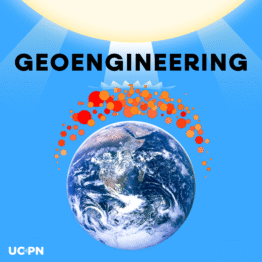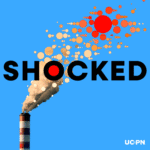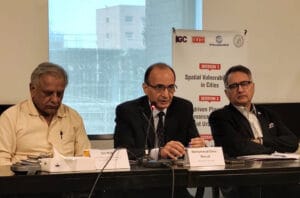The 2025 EPIC Air Quality Fund awardee, Urban Unit, has launched the largest open-access, real-time particulate pollution monitoring network in Pakistan, the first of its kind. With the installation of 160 PM2.5 monitors across 14 major cities—Lahore, Sialkot, Peshawar, Rawalpindi, Murree, Quetta, Multan, Karachi, Bahawalpur, Islamabad, Kasur, Hyderabad, Gujranwala, Faisalabad—the initiative covers 57 percent of the country’s urban population, or approximately 53.14 million people.
Pakistan currently records PM2.5 concentrations that are 8 times higher than the World Health Organization’s (WHO) recommended limit. According to the Air Quality Life Index, these concentrations reduce average life expectancy by around 3.3 years.
The Urban Unit Air Quality Network represents a transformative step in environmental governance. By making real-time data accessible to the public, researchers, and policymakers, the initiative aims to create a critical mass of evidence for targeted air quality interventions. It also strengthens the case for implementing and enforcing meaningful national ambient air quality standards.
Source: Muhammad Omar Masud at the IGC Workshop on Spatial Vulnerabilities in Cities in April 2025.
“We are trying to lay the foundation of an open-air quality network that transcends bureaucracy, conventions, and practices for evolving a bold approach for tackling the problem of air quality.”
Muhamad Omar Masud, CEO, Urban Unit
Pakistan’s Air Quality: At A Critical Turning Point
Air pollution is now one of the leading threats to life expectancy in Pakistan (Figure 1). While Pakistan has formal air quality standards through its National Environmental Quality Standards (NEQS) for PM2.5, PM10, NO2, and SO2, enforcement remains weak. The disconnect between regulation and implementation leaves the public vulnerable to air pollution.
Currently, Pakistan’s 248.8 million people live in areas where the annual average particulate pollution levels exceed the WHO guideline. In the most polluted province—Islamabad Capital Territory—an average resident could live more than 4 years longer if particulate concentrations met the WHO guideline (Figure 2). If particulate concentrations in Pakistan’s most polluted regions were reduced to meet at least the country’s national standard, which was revised from 15 µg/m³ to 35 µg/m³ in 2023, the potential gains in life expectancy could be 2.7 years.
A 2023 analysis by EPIC ranked Pakistan as a “higher opportunity country” for air quality improvement. The analysis highlights that modest investments in monitoring infrastructure can catalyze national-level change, especially given Pakistan’s historically low density of air quality monitors and lack of open data.
Figure 1: Key threats to Pakistan’s life expectancy
Sources: Global Burden of Disease, WHO Life Table
Note: PM2.5 relative to the WHO guideline bar displays the reduction in life expectancy relative to the WHO guideline, as calculated by AQLI 2023 data.
Figure 2: PM2.5 levels across the Top 7 most Polluted States in Pakistan in 2023
Source: Air Quality Life Index, 2023
Note: All annual average PM2.5 values (measured in micrograms per cubic meter: µg/m³) are population weighted. To learn more about the methodology used by the AQLI, visit here.
Laying the Groundwork for a National Movement
In addition to installing the largest network of air quality monitors in Pakistan, the Urban Unit is catalyzing a nationwide effort to improve air quality by fostering strategic partnerships with key institutions, including the Wildlife and Parks Departments, Forest Departments, Forman Christian College and Chartered University, the Bank of Punjab, G3 Engineering Consultants, Model Town CD Ground, IEEE at the University of Punjab, and the University of Education Township. These collaborations aim to equip citizens with reliable, real-time air quality data to support informed advocacy and drive evidence-based policy reform.
“We are honored to partner with The Urban Unit under the EPIC grant for the installation of an air quality monitor on campus. The real-time data will help support research and raise awareness about air pollution among the Forman Christian College community. In keeping with our long-standing motto (“By love, serve one another”), we view this initiative as another step toward serving society, in this case through environmental responsibility and informed action.”
Dr. Jonathan S. Addleton, Rector, Forman Christian College (A Chartered University) and former US Ambassador to Mongolia.
By ensuring open and public access to this data, the initiative is also empowering local governments to identify pollution hotspots, monitor trends, and take timely action. This foundational work not only strengthens community engagement but also lays the groundwork for a coordinated national response to Pakistan’s air pollution crisis.
“The Urban Unit’s air quality network marks a turning point for Pakistan. By making air quality data openly available at this scale for the first time, Urban Unit is empowering communities and decision-makers alike with the evidence they need to act. It shows how modest investments in open monitoring can catalyze transformative change—something we hope to see replicated across other countries facing severe air pollution challenges.”
Christa Hasenkopf, Director, EPIC Clean Air Program
























